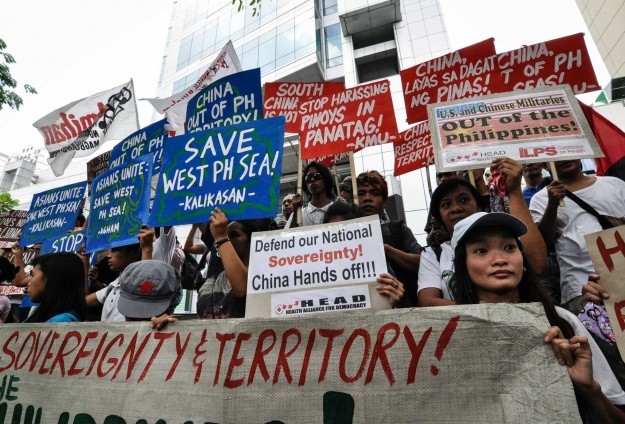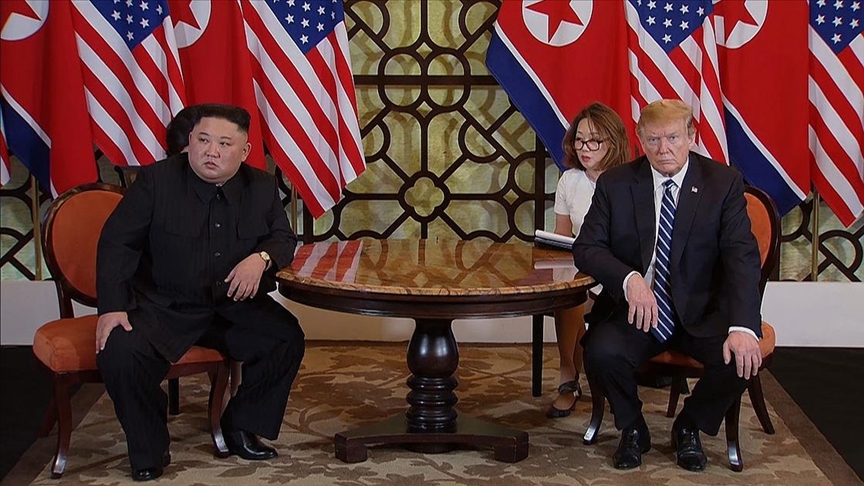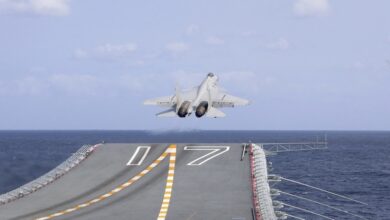 As protesters gathered back home, Philippine President Benigno Aquino III denounced China’s “unlawful territorial claims” in the South China Sea during a four-day visit to Japan.
As protesters gathered back home, Philippine President Benigno Aquino III denounced China’s “unlawful territorial claims” in the South China Sea during a four-day visit to Japan.
Speaking to the upper house of Japan’s bicameral parliament, Aquino asserted that the maritime and coastal stability of Southeast Asia is “at risk of being disrupted by attempts to redraw the geographic limits and entitlements outside those clearly bestowed by the law of nations.”
Meanwhile in Manila, crowds gathered outside’s China’s embassy Thursday waving placards that said ” China out of PH waters,” and “South China Sea does not belong to China.”
According to anadolu Agency, The Philippines has been especially aggressive in opposing China’s encroachment on small reefs and atolls that are also claimed not just by the Philippines, but five other nations. It has filed a formal complaint with the Tribunal of the Law of the Sea over China’s “nine-dash line” — heavy purple dashes on official Chinese maps that make it seem as if Beijing is formally claiming virtually the entire South China Sea.
Manila knows the area as the “West Philippine Sea.”
Beijing has ignored the tribunal petition and has been deliberately vague about what the nine dash lines on the map actually stand for. On Thursday, China’s state media responded with its own attack on Aquino’s remarks, saying that they showed an ignorance of history and a disregard for basic facts regarding the area.
At one stage during the visit, Aquino likened China to Nazi Germany, by hinting at similarities between Beijing’s land reclamation in the area and Nazi Germany’s expansionist moves before World War II.
“Though calling himself an amateur learner of history, Aquino is ignorant both of history and reality,” Xinhua reported Wednesday.
“China’s claim of the South China Sea Islands is about protecting its sovereignty, which cannot be compared to Nazi Germany’s expansion prior to World War II.”
It also accused Manila of “making waves” by colluding with regional players “and even outside power to selfish gains.”
Manila is encouraged in its hard-liner stance by the fact that it is the only country among the various claimants that has a formal defense alliance with the United States.
U.S. Secretary of Defense Ashton Carter had stopped in Manila to confer with his Philippine counterpart, Voltaire Gazmin, before flying to Singapore for the Shangri-La security conference. The Philippines is also cultivating a growing association with Japan. Earlier this year, Japanese warships took part in naval exercises with the U.S. and the Philippines.
During his Japan trip, Aquino met with Prime Minister Shinzo Aquino and they discussed security cooperation, signing the formal agreement under which Japan will supply the Philippines with ten patrol craft and possibly other military equipment.
The visit comes when the South China Sea territorial issue is on the boil. Even as Aquino was in Japan, high-ranking officers from China and the U.S. were exchanging charges over the Chinese reclamation work underway on half a dozen tiny reefs and atolls claimed by China.
Secretary of Defense Carter said Washington would not respect the territorial claims that the U.S. considers illegitimate.
“Make no mistake. The U.S. will operate wherever international law allows,” he warned while still in Honolulu.
Washington has backed this up with close in reconnaissance flights by U.S. Navy surveillance aircraft based at Kadena Air Force Base in Okinawa. Aquino is almost as well traveled as the Japanese premier, having made 47 trips abroad since taking office. Five of them have been to Japan, which the Philippines is actively courting as a counterweight to China’s supposed expansion in Southeast Asia.
He isn’t alone. Only a couple weeks before the Aquino visit, Abe hosted a visit by Tun Adul Razak, prime minister of Malaysia, which has territorial claims in the South China Sea, and earlier hosted a state visit by Indonesian President Joko Widodo. Jakarta has no claims as such but is concerned about China’s closing off lucrative fishing areas in the region. In both visits, security was high on the agenda.
[adrotate banner=”46″]
 As protesters gathered back home, Philippine President Benigno Aquino III denounced China’s “unlawful territorial claims” in the South China Sea during a four-day visit to Japan.
As protesters gathered back home, Philippine President Benigno Aquino III denounced China’s “unlawful territorial claims” in the South China Sea during a four-day visit to Japan.

